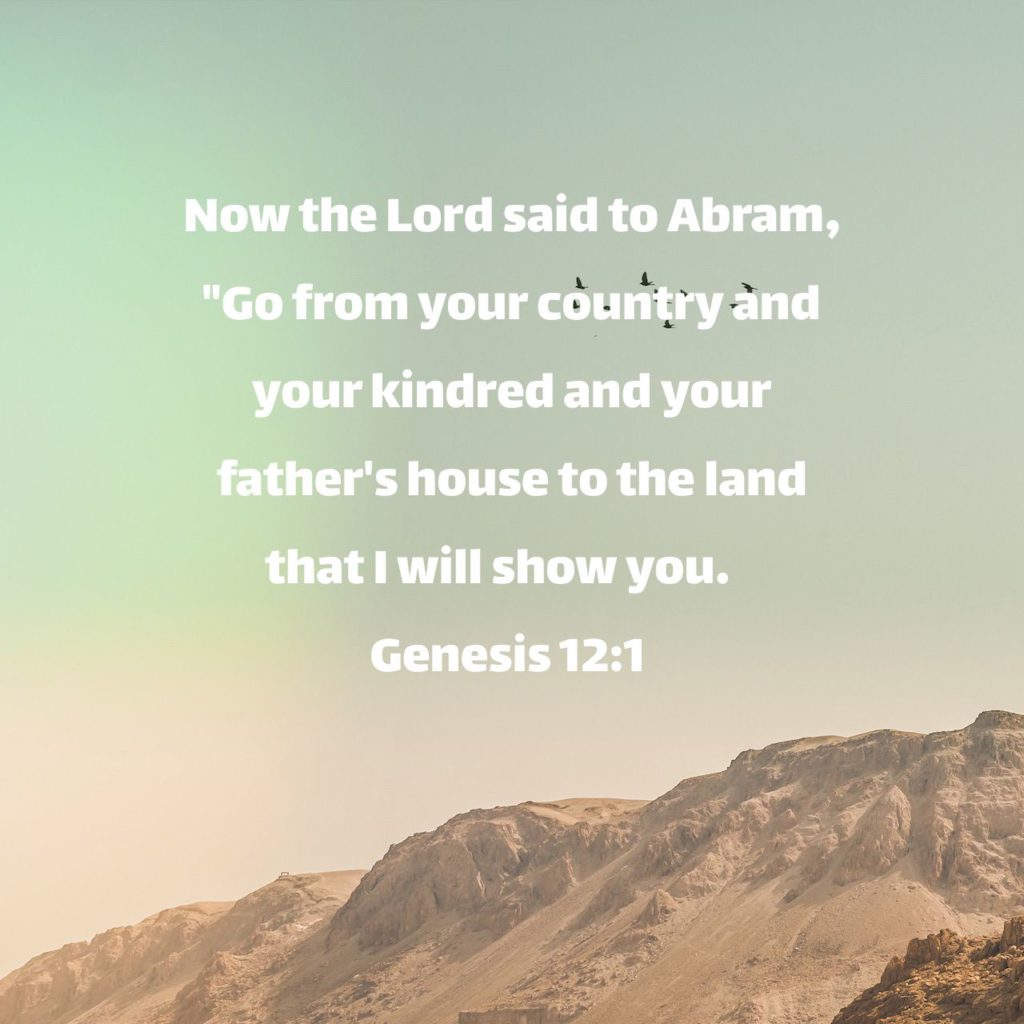
1 Now the LORD said to Abram, “Go from your country and your kindred and your father’s house to the land that I will show you.
The last person god spoke directly to was Noah and his family. Now after ten generations of silence, God reaches out to Abram. Abram does not call out to God, and might not even be seeking God. In fact Abram might not even know who this God is. The state of the world has changed, people are seeking out other gods, and Abram might have been one of them. But for whatever reason God chooses to speak to Abram.
He calls Abram to finish the journey his Father started, leaving everyone else behind if he must.
2 And I will make of you a great nation, and I will bless you and make your name great, so that you will be a blessing. 3 I will bless those who bless you, and him who dishonors you I will curse, and in you all the families of the earth shall be blessed.”
If Abram decided to follow God’s command, God offers to make Abram and his descendants into a great nation, a nation that serves God, and he will bless them.
4 So Abram went, as the LORD had told him, and Lot went with him. Abram was seventy-five years old when he departed from Haran.
Abraham listens to God. He obeys this God that he might not have even heard about prior to now immediately. It is assumed that he told his family of this revelation and decision, as Lot, his nephew chooses to go with him. Abram is 75, past the normal age of child bearing, but in comparison to the ages of people listed in the genealogy in chapter 11, he still is young, perhaps the equivalent of someone in their late 30s early 40s.
5 And Abram took Sarai his wife, and Lot his brother’s son, and all their possessions that they had gathered, and the people that they had acquired in Haran, and they set out to go to the land of Canaan. When they came to the land of Canaan, 6 Abram passed through the land to the place at Shechem, to the oak of Moreh. At that time the Canaanites were in the land.
Abram, Sarai, and Lot are not the only ones heading to Canaan. Their family is apparently wealthy, and they have servants that they hired in Haran. This entourage could have been anything from a few people to a massive group. They come to Canaan to find that people are already living there, the Canaanites.
7 Then the LORD appeared to Abram and said, “To your offspring I will give this land.” So he built there an altar to the LORD, who had appeared to him.
The text says God appeared to Abram, suggesting that Abram visibly saw God, perhaps even in an embodied form. This is the first time God is mentioned as being seen by a person since Adam and Eve, but it will not be the last, God, or an angelic being, often appear visibly throughout the Bible.
Despite the fact that the land already has inhabitants, God promises that this land, Canaan will be given to Abrams descendants. Abram builds an altar there to commemorate this promise, and probably also to mark this as the site where God first appeared to him.
8 From there he moved to the hill country on the east of Bethel and pitched his tent, with Bethel on the west and Ai on the east. And there he built an altar to the LORD and called upon the name of the LORD. 9 And Abram journeyed on, still going toward the Negeb.
Abram does not stay at Shechem but continues south ward, toward Bethel, which is one of the southernmost settlements before the Negev, a harsh desert landscape. Eventually Abram settles in the Negev, perhaps because he is then not bothering any of the Canaanites, and therefore not seen as a threat.
10 Now there was a famine in the land. So Abram went down to Egypt to sojourn there, for the famine was severe in the land.
About the time that Abram reaches the Negev desert, famine comes to the land of Canaan. As such Abram decides to go to Egypt. He leaves the promised land because the food shortage is so severe.
11 When he was about to enter Egypt, he said to Sarai his wife, “I know that you are a woman beautiful in appearance, 12 and when the Egyptians see you, they will say, ‘This is his wife.’ Then they will kill me, but they will let you live. 13 Say you are my sister, that it may go well with me because of you, and that my life may be spared for your sake.”
Abram makes a choice here that seems odd. Many are quick to chastise Abram’s lack of faith in lying about his wife to spare himself. However, given what he knew of the Egyptians, who had already become a thriving empire, this was not a horrible decision.
Keep in mind that Pharaoh was considered a god-king, and at this time this paticular pharaoh may have been alive for hundreds upon hundreds of years. People fear him and he takes whatever he wants. Abram was forced between choosing to protect human life or human decency.
By saying Sarai is his sister, Abram is not technically lying as we find out later. However they are choosing to be deceitful.
14 When Abram entered Egypt, the Egyptians saw that the woman was very beautiful. 15 And when the princes of Pharaoh saw her, they praised her to Pharaoh. And the woman was taken into Pharaoh’s house.
Abram’s fears are well founded, as the Egyptians do exactly what Abram thought they would do, and Pharaoh himself took Sarai into his house.
16 And for her sake he dealt well with Abram; and he had sheep, oxen, male donkeys, male servants, female servants, female donkeys, and camels.
Because of Sarai being willing to say she was Abram’s sister rather than his wife, instead of killing Abram, Pharaoh blesses him, and makes him a very wealthy man. This may have been a form of dowry payment for Sarai.
17 But the LORD afflicted Pharaoh and his house with great plagues because of Sarai, Abram’s wife.
God punishes Pharaoh for taking Sarai, not Abram for lying about her.
18 So Pharaoh called Abram and said, “What is this you have done to me? Why did you not tell me that she was your wife? 19 Why did you say, ‘She is my sister,’ so that I took her for my wife? Now then, here is your wife; take her, and go.” 20 And Pharaoh gave men orders concerning him, and they sent him away with his wife and all that he had.
How Pharaoh learned that Sarai was Abram’s wife the text is not clear. Perhaps God notified Pharaoh, or perhaps Pharaoh questioned Sarai when the plague first appeared.
Upon realizing that he was being punished for marrying another man’s wife, Pharaoh confronts Abram. He could have killed him on the spot, but for fear of more punishment, Pharaoh instead sends Abram and Sarai away, along with all their belongings, including the wealth Abram acquired from Pharaoh while in Egypt.
The Holy Bible: English Standard Version. (2016). (Ge 12:1–20). Wheaton, IL: Crossway Bibles.
